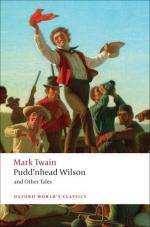Our Government is oddly inconsistent in this matter of official dress. When its representative is a civilian who has not been a solider, it restricts him to the black swallow-tail and white tie; but if he is a civilian who has been a solider, it allows him to wear the uniform of his former rank as an official dress. When General Sickles was minister to Spain, he always wore, when on official duty, the dress uniform of a major-general. When General Grant visited foreign courts, he went handsomely and properly ablaze in the uniform of a full general, and was introduced by diplomatic survivals of his own Presidential Administration. The latter, by official necessity, went in the meek and lowly swallow-tail—a deliciously sarcastic contrast: the one dress representing the honest and honourable dignity of the nation; the other, the cheap hypocrisy of the Republican Simplicity tradition. In Paris our present representative can perform his official functions reputably clothed; for he was an officer in the Civil War. In London our late ambassador was similarly situated; for he, also, was an officer in the Civil War. But Mr. Choate must represent the Great Republic—even at official breakfasts at seven in the morning—in that same old funny swallow-tail.
Our Government’s notions about proprieties of costume are indeed very, very odd—as suggested by that last fact. The swallow-tail is recognised the world over as not wearable in the daytime; it is a night-dress, and a night-dress only—a night-shirt is not more so. Yet, when our representative makes an official visit in the morning, he is obliged by his Government to go in that night-dress. It makes the very cab-horses laugh.
The truth is, that for awhile during the present century, and up to something short of forty years ago, we had a lucid interval, and dropped the Republican Simplicity sham, and dressed our foreign representatives in a handsome and becoming official costume. This was discarded by-and-by, and the swallow-tail substituted. I believe it is not now known which statesman brought about this change; but we all know that, stupid as he was as to diplomatic proprieties in dress, he would not have sent his daughter to a state ball in a corn-shucking costume, nor to a corn-shucking in a state-ball costume, to be harshly criticised as an ill-mannered offender against the proprieties of custom in both places. And we know another thing, viz. that he himself would not have wounded the tastes and feelings of a family of mourners by attending a funeral in their house in a costume which was an offence against the dignities and decorum prescribed by tradition and sanctified by custom. Yet that man was so heedless as not to reflect that all the social customs of civilised peoples are entitled to respectful observance, and that no man with a right spirit of courtesy in him ever has any disposition to transgress these customs.




